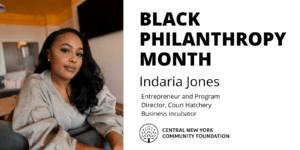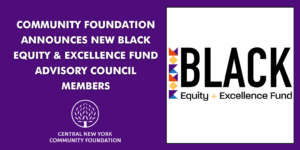
Apply for a Black Equity & Excellence Grant
The Black Equity & Excellence Fund supports projects that center, uplift, and serve Black communities in Central New York by addressing economic and social disparities caused by historic marginalization. The fund is dedicated to fostering self-sufficiency, economic development, and community empowerment.
To be eligible, prospective applicants must meet the following criteria:
- Organizations that are Black-led and/or demonstrate accountability to the Black community.
- Organizations with demonstrated commitment to serving and uplifting Black communities through their mission, programs, and leadership.
- Organizations that seek to address systemic change by targeting any of the focus areas listed below.
- 501(c)(3) tax-exempt nonprofit organizations, publicly supported organizations such as schools and municipalities, or organizations using a 501(c)(3) fiscal sponsor. The use of a fiscal sponsor from a non-Black organization is permitted.
- Organizations serving residents of Onondaga or Madison counties
In some instances, multi-year grants may be available, if funding allows. For more information, contact Darrell Buckingham at 315.883.5559 or dbuckingham@cnycf.org.
How to Apply for a BE&E Grant
Before you begin your application, we ask that you connect with our team to discuss your grant idea. Please email Darrell Buckingham, Senior Program Officer, at DBuckingham@cnycf.org or complete this short form to schedule a meeting.
Step 1: Register in Our Grant Portal
All applicants must register in our new grants portal before submitting an application.
- You can register now or wait until you’re ready to apply.
- If you had an account in our old portal before July 15, 2024, you’ll still need to create a new one.
- Not sure if your organization is already registered? Contact us at grants@cnycf.org before creating a new account.
Click here for step-by-step guides on how to register and navigate the portal.
Step 2: Complete the Eligibility Survey
After registering, you’ll be asked to fill out a short eligibility survey before accessing the full application.
Step 3: Submit Your Application
You’ll begin by telling us about your project and what you hope to achieve with funding. We also welcome creative ways to share your project! You can attach the following to your online application:
- A written narrative
- A short video
- A PowerPoint
- An audio recording
Note: If your organization is not a 501(c)(3) nonprofit, you may apply using a fiscal sponsor.
Projects must benefit the Black community or build upon the capabilities of your organization. Projects that focus on one of the following interest areas would qualify for a Black Equity & Excellence grant:
- Black Creatives
- Black Leadership + Advancement
- Black LGBTQIA+
- Black Mental Wellness
- Black Legacy + Generational Wealth
- Black Business
- Black Maternal Health
- Black Civic Engagement
- Black Youth + Students
- Black Tech
Project funding levels are as follows:
- Grassroots Organizations/Businesses with a Fiscal Sponsor: $10k and under
- Pilot programs or small projects: $11k-$25k
- Expansion of existing projects: $26k-$55k
- Large capital projects or renovations: $56k-$75k
We do not make grants for the following:
- Annual operating budgets, except when it is “seed” or “bridge” funding
- Endowments
- Religious purposes
- Loans or assistance to individuals
- Medical or academic research (except where requested by a donor)
- Activities that occurred before the Community Foundation’s decision date
If your nonprofit has received a Black Equity & Excellence grant, we request that you submit a final report. These reports assist us in assessing our grantmaking efforts.
Who can apply?
Eligible applicants must be either Black-led and/or demonstrate accountability to the Black community. Organizations must demonstrate commitment to serving and uplifting Black communities in Onondaga or Madison counties through their mission, programs, and leadership.
What can I request funding for?
You may request funding for projects that will benefit the Black community or build upon the capabilities of your organization. Requests for program-related needs, operational support or capital improvements are eligible.
What can I not request funding for?
We do not provide funding for annual operating budgets, except when it is “seed” or “bridge” funding, endowments, religious purposes, loans or assistance to individuals for personal reasons, medical or academic research or activities that occur before our decision date.
How much funding can I request?
Appropriate request amounts vary based upon the project you are seeking funding for. Below are guidelines to consider when submitting an application:
- Grassroots Organizations/Businesses with Fiscal Sponsors: $10k and under
- Pilot programs or small projects: $11k-$25k
- Expansion of existing projects: $26k-$55k
- Large capital projects or renovations: $56k-$75k
Who makes the funding decisions?
The Black Equity & Excellence Advisory Council, comprised of changemakers that demonstrate accountability to the Central New York Black community, is charged with reviewing grant proposals and making funding recommendations as well as identifying gaps and opportunities to create a more equitable and economically inclusive Central New York for the Black community. Members represent a cross-section of industries and backgrounds for varying viewpoints.
When will I be notified?
All applicants will be notified via email following each Black Equity & Excellence Council meeting. This meeting occurs approximately one month after each grant application deadline.
My request was declined. Now what?
An unsuccessful application does not necessarily reflect the worthiness of a particular project. We receive more requests than we can fund. Any agency whose request has been declined is encouraged to contact us to discuss specific reasons for the rejection.
Who can I contact?
For more information please contact Program Officer, Darrell Buckingham at 315.422.9538 or grants@cnycf.org.
The Community Foundation can only pay grants to registered 501(c)3 nonprofit organizations (including churches) or to a public entity such as a town, public school or state agency. All others will need to use a fiscal sponsor.








